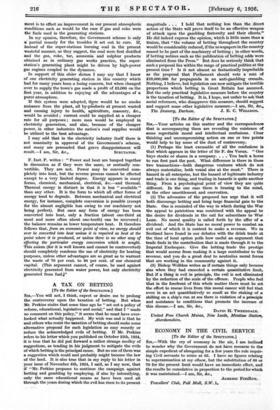A TAX ON BETTING
[Te the Editor of the SPECTATOR.] Sia,—You will not, I think, expect or desire me to prolong the controversy upon the taxation of betting. But when Mr. Perkins states that some time ago he " set out a policy of reform, educational, legislative and social," and that I " made no comment on this policy," it seems that he must have over- looked what actually happened. My wish was and is that he and others who resist the taxation of betting should make some alternative proposal for such legislation as may remedy or reduce the acknowledged evils of betting. If Mr. Perkins refers to his letter which you published on October 25th, 1924, it is true that he did put forward a rather strange medley of suggestions, as tending in his judgment to mitigate the evils of which betting is the principal cause. But no one of them was a suggestion which could and probably might become the law of the land. It is also true that in my reply to his letter in your issue of November 8th, 1924, I said, as I say now, that if "Mr. Perkins proposes to continue the campaign against betting and gambling by employing, if also by intensifying, only the same educational means as have been used all through the years during which the evil has risen to its present magnitude . . . I hold that nothing less than the direct action of the State will prove itself to be an effective weapon of attack upon the gambling fraternity and their clients." He did indeed express the opinion, which is little more than a truism, that "the volume of betting throughout the country would be considerably reduced, if the newspapers in.the country ceased to be part of the machinery of betting ; in other words, if betting notices such as the publication of betting odds were eliminated from the Press." But does he seriously think that such a proposal lies within the range of practical politics at the present time ? Is it not almost as fantastically improbable as the proposal that Parliament should vote a sum of £10,000,000 for propaganda in an anti-gambling crusade. Nothing, I believe, but legislation can now mitigate the terrible proportions which betting in Great Britain has assumed. But the only practical legislative measure before the country is the taxation of betting. It is, I hope, not unfair to ask that social reformers, who disapprove this measure, should suggest and support some other legislative measure.—I am, Sir, &c.,


























































 Previous page
Previous page